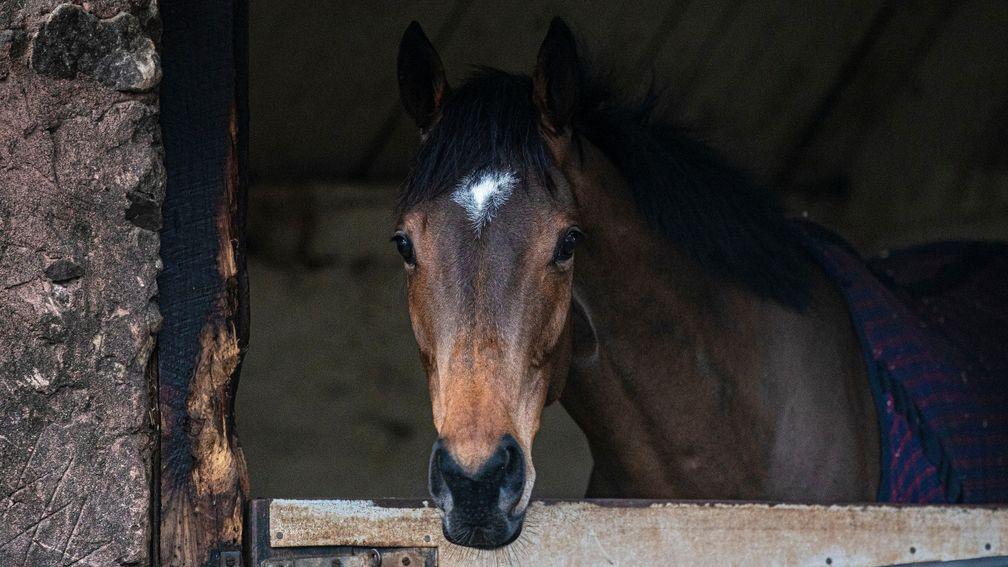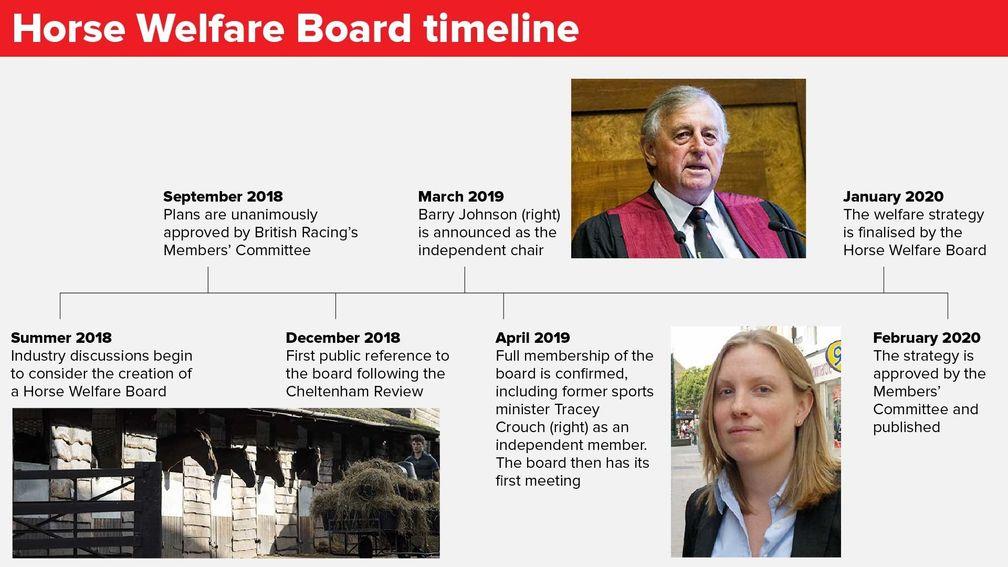'Pivotal moment for racing' as Horse Welfare Board releases five-year strategy

An ambitious and innovative five-year plan drawn up by the Horse Welfare Board with “respect for the horse” at the heart of it has received a broad welcome from racing’s often divided interests.
In what is being described as a pivotal moment for racing, the HWB’s 130-page document, released on Thursday and titled 'A Life Worth Living', proposes a strategic five-year plan for the welfare of horses bred for racing and commits to a lifetime of responsibility, measuring quality of life and wellbeing from birth to death and making use of unprecedented data to minimise injury and manage safety.
Among the 20 recommendations are stronger penalties for misuse of the whip, improved traceability for horses throughout their lifetime and a proactive campaigning approach to communication with the public in order to change existing perceptions and misunderstandings around the care and treatment of racehorses during and after racing.
A reform of the whip rules is mentioned, with the HWB calling for a consultation "as quickly as possible and ideally by the end of October" on the subject with increased penalties for rule breaches "a clear, minimum recommendation".
Outlining the seriousness the HWB is placing on the reports, chair Barry Johnson said: "Both [HWB board member] Tracey Crouch and I would feel that if there are strong recommendations in this report that were not being looked at seriously, then we'd walk away."
Flat trainers William Haggas and Andrew Balding were among those to speak out in support of the proposals, with Haggas stressing it was nice to see the sport "on the front foot on horse welfare".
He said: “I fully support it. We have to get the message out that racehorses are about the best looked after animals in the country.
“I know there’s much more to it than that but it’s very nice to see racing is on the front foot on horse welfare and this report has got to be championed. I think they have done a good job.”
Andrew Balding spoke in similar vein and said: “We must never sit on our laurels regarding horse welfare. We must always be leading the way, striving to improve, and I think it's been a very worthwhile exercise. We can’t ignore it and we must all be very supportive.
“It covers an extensive range of topics and it would be entirely wrong to focus on the whip, as so far as welfare issues go that’s pretty low down the list. I think everyone wants the same thing, and recognising our responsibilities is a start. We have to be sensible about how we go about achieving those goals.”
The Horse Welfare Board is an independent body which reports to the sport's tripartite Members’ Committee, where the BHA, racecourses and participants share responsibility for the industry’s strategy and decisions not reserved to the regulator. It was established last April to produce a strategy that unites the whole industry and drives continuous improvement.
Johnson, who emphasised that the strategy was just the beginning of a journey which would evolve and develop over its five-year lifespan, said: “The horse is at the core of our philosophy, and our vision is one the industry should be inspired to attain. It ensures that, during the lifetime of the horse, all facets of its welfare are scrutinised, understood and, where possible, improved.
The strategy: four key outcomes
1 Best possible quality of life, relating to the encouragement and furthering of best practice in all aspects of health, care, husbandry and disease control.
2 Collective lifetime responsibility, incorporating, for example, traceability across the lifetimes of horses bred for racing, and initiatives fostering greater understanding, encouragement and effective enforcement of responsibility.
3 Best possible safety, the understanding and analysis of multiple risk factors and the continuing reduction of reasonably avoidable injuries and fatalities.
4 Growth and maintenance of public trust.
"We have to show why horses have such a special place in our national life, and explain the sport’s high standards of welfare more confidently and pro-actively to the wider world.”
Johnson, who said the board supported the idea of “an annual event dedicated to celebrating our horses as champions and partners”, added: “Every single person working in racing has their part to play.”
The BHA will be responsible for some of the report's recommendations and has committed to draw up an implementation plan which will prioritise, fund and resource the projects involved which relate to the sport’s regulatory and governing body.
BHA chair Annamarie Phelps, speaking from the Asian Racing Conference in Cape Town, said: “The important thing is to leave Barry Johnson and his group to develop their strategy. We will go through the report and work up our implementation plan, seeing what needs to be done and by whom.
“We have to be clear that this is not a BHA report, but we are fully supportive of the group. They have done a fantastic job in eight months to get the report together and I commend them for that.

“Of course, there will be some areas where people have different views, but that’s why you consult and why it’s going to take a while to roll it out.”
Chief executive Nick Rust added: “I am proud of the work already done by the sport, including our own team of vets and officials, to give our horses the best possible quality of life. When I saw the scale of the Welfare Board’s ambition, I was even more proud. Racing people want the very best for our horses. We would love more people outside our sport to understand just how much we put into keeping horses safe and allowing them to enjoy the quality of life that goes with being an equine athlete.
“I know our sport has been frustrated at times because it feels not enough has been done to speak up for racing. I firmly believe that the strategy gives us a platform to talk about all the good things we do with pride and confidence. That is why it is a pivotal moment, an opportunity to show that we can be trusted to do the right thing for our horses.”
Rupert Arnold, chief executive of the National Trainers Federation, said: “The NTF is very positive about this. Trainers think they do things very well already but they also acknowledge the collective responsibility they all have and I’m sure they will take on board the concept of proving to themselves and to the public how good they are.”

He added: “As sports people they are competitive and they get the concept of continuous improvement. If the research from the various projects that have been suggested shows that there are areas in which we can enhance these standards I’m sure that they will be on board.
“Taken as a whole I would say there were no dissenting voices. There will be little bits that certain people will pick out and say they don’t agree with, and how the proposed horse welfare assessment tool will work remains to be seen, but the Horse Welfare Board is clear that they don’t expect everyone to agree with everything.”
David Armstrong, chief executive of the Racecourse Association also welcomed the report and said: “The publication of the Horse Welfare Board’s strategy represents a significant moment for the sport.
“The process to develop the strategy was incredibly thorough and I’m delighted to see data used in such a conscientious way to give weight to certain arguments. My sincere thanks to the Horse Welfare Board for their dedication over the past months and to all racecourses for their unwavering support.
“The breadth of the strategy is such that we can be sure all elements of a horse’s life are given the attention they deserve, including on and off the racecourse. We look forward to working alongside the sport in adopting the recommendations and ensuring the fantastic level of care for our equine participants remains at the forefront of our minds as we look to reaffirm our support from, and relevance to, the British public.”

The five-year-strategy in numbers
130 pages of the report
20 key recommendations
26 key projects
8 members of the Horse Welfare Board
Read this next
Horse Welfare Board: who are the members?
Willie Mullins backs welfare changes to 'bring the sport forward'
Whip recommendations set to feature in landmark welfare strategy report
BHA unveils eight videos to showcase importance sport places on equine welfare
Read The Lowdown from 8.00am daily on racingpost.com and the Racing Post mobile app with all the day's latest going, weather, market moves and non-runner news
Published on 20 February 2020inBritain
Last updated 19:27, 20 February 2020
- 'We feel he's coming to his peak' - Fergal O'Brien appoints Johnny Burke as new stable jockey
- 'I don't think I've seen a horse work better' - Karl Burke issues bullish update on 2,000 Guineas contender Night Raider
- Who remains in contention for the 2,000 and 1,000 Guineas at Newmarket this weekend?
- Trueshan declared for Sagaro return at Ascot on Wednesday - but Alan King thinks a 'personal best' is required
- Racing has a rich history - it's time to breathe a bit of life and vision into highlighting it
- 'We feel he's coming to his peak' - Fergal O'Brien appoints Johnny Burke as new stable jockey
- 'I don't think I've seen a horse work better' - Karl Burke issues bullish update on 2,000 Guineas contender Night Raider
- Who remains in contention for the 2,000 and 1,000 Guineas at Newmarket this weekend?
- Trueshan declared for Sagaro return at Ascot on Wednesday - but Alan King thinks a 'personal best' is required
- Racing has a rich history - it's time to breathe a bit of life and vision into highlighting it